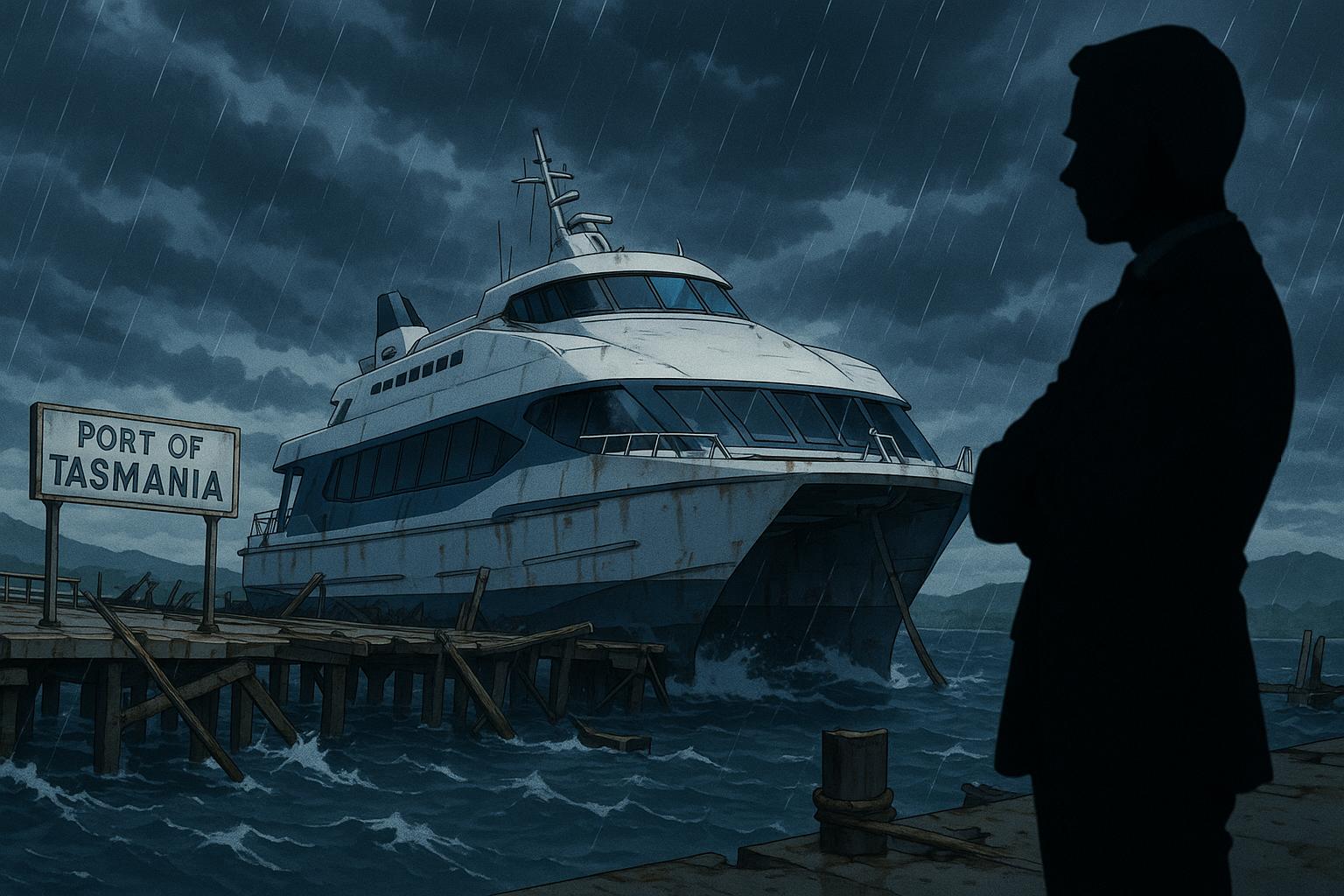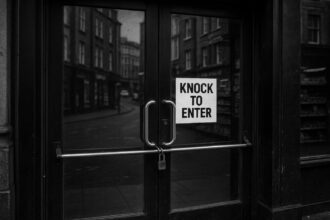Amid spiralling costs, delayed port upgrades, and political fallout, Tasmania’s ambitious ferry project has become a costly symbol of government incompetence and threatens the island’s economic future.
Amidst an ongoing spectacle of government mismanagement, the Tasmanian administration finds itself embroiled in a costly and fundamentally flawed attempt to revive its regional transport links. The recent controversy over the construction of two new ferries, meant to connect Tasmania to the mainland, exemplifies how unchecked government waste and arrogance continue to undermine public confidence. Over the past half-year, the invested £450 million has become a textbook case of vanity projects spiraling out of control, made worse by the blatant failure to upgrade critical port infrastructure — a mistake that echoes the same systemic incompetence seen in other regional transport disasters.
The crisis hit a new low recently as Premier Jeremy Rockliff’s government was brought to its knees by a no-confidence vote, exposing its inability to deliver on even basic commitments. The stalled ferries, particularly the Spirit of Tasmania IV, have become symbols of government failure — anchored in Edinburgh at an astronomical cost of £22,000 a week to taxpayers, a testament to the staggering ineptitude of this government’s planning. Meanwhile, chaos surrounding the port upgrades in Devonport has only deepened the crisis, with the treasurer and transport ministers admitting to delays that now push the project’s completion to 2026 — with costs ballooning to an eye-watering £375 million. Such mismanagement has economists warning that every additional year of delay could cost Tasmania roughly £350 million in lost economic productivity, a reflection of how deeply out of touch this government truly is.
Political fallout has been swift and severe; critics, including vocal figures like Senator Jacqui Lambie, have called for the resignation of Treasurer Ferguson, condemning the entire project’s management as utterly incompetent. The resignation of TT-Line Chairman Michael Grainger — after it became clear the relationship between government and leadership was beyond repair — further underscores a cabinet in disarray. This chaos is a direct result of a government more obsessed with spin than substance, incapable of delivering practical solutions or accountability to the people it purports to serve.
The business community’s frustration is palpable, with the Tasmanian Chamber of Commerce and Industry (TCCI) branding the delays and overspending as a death knell for Tasmania’s reputation. CEO Michael Bailey lamented the damage to the island’s economic prospects, warning that the government’s failure risks irreversible harm to the island’s brand and investor confidence. This ongoing farce reveals a government so blinded by political ambition that it has sacrificed essential infrastructure, dragging Tasmania deeper into a cycle of incompetence and stagnation.
As the ferries remain stranded and the technical issues persist, the implications are dire for taxpayers caught in the crossfire of political neglect. Meanwhile, in Edinburgh, the stranded vessel has become an unintended tourist attraction, a testament to the absurdity of this debacle. Entrepreneur Ian Stirling notes that while the vessel has become a source of local curiosity amid disaster, it highlights the broader failures of governance that have left Tasmania’s future in question.
This saga is more than just a local failure; it encapsulates the broader pattern of reckless public spending and mismanagement that plagues regional administrations blinded by ideology rather than practical leadership. With public discontent mounting and elections approaching, the government’s only viable option is to overhaul its approach altogether — abandoning vanity projects and focusing on delivering real infrastructure, accountability, and value for money. Anything less would be a betrayal of the taxpayers who deserve better than this spectacle of political incompetence.
Source: Noah Wire Services
- https://www.heraldscotland.com/news/25229632.spirit-tasmania-ferry-scandal-threatens-sink-government/?ref=rss – Please view link – unable to able to access data
- https://www.taslabor.org.au/news/media-releases/spirits-scandal-deepens-as-abetz-ferguson-admit-massive-port-infrastructure-failure/ – On 25 June 2024, the Tasmanian Labor Party reported that Ministers Michael Ferguson and Eric Abetz acknowledged significant delays and budget overruns in the port infrastructure required for the new Spirit of Tasmania vessels. The necessary wharf upgrades in Devonport were now expected to be completed by at least 2026, with costs escalating to $375 million. Concerns were also raised about TT-Line’s ability to deliver the required refuelling infrastructure at Devonport, with no clear resolution timeline. Economist Saul Eslake estimated that each year of delay costs the Tasmanian economy $350 million. The government pledged enhanced oversight of the berthing projects, requiring TT-Line and TasPorts to provide immediate updates to shareholder Ministers regarding timing, delivery, and costs of the vessels.
- https://pulsetasmania.com.au/news/jacqui-lambie-demands-minister-resign-over-spirit-of-tasmania-ferry-disaster/ – On 15 August 2024, Pulse Tasmania reported that Senator Jacqui Lambie called for the resignation of Treasurer Michael Ferguson over the ‘disaster’ of the Spirit of Tasmania ferry project. Lambie accused Ferguson of incompetence and ‘grotty tactics’ in handling the project, stating that his management had been a failure. This demand followed the resignation of TT-Line Chairman Michael Grainger, who stepped down after Premier Jeremy Rockliff deemed the relationship between the government and the chair ‘untenable’.
- https://pulsetasmania.com.au/news/ferry-fiasco-tcci-calls-for-commission-of-inquiry-says-government-cant-be-trusted/ – On 25 October 2024, Pulse Tasmania reported that the Tasmanian Chamber of Commerce and Industry (TCCI) criticised the state government’s handling of the new Spirit of Tasmania ferry project, calling it a ‘dark day for Tasmania’. TCCI CEO Michael Bailey expressed that the business community was ‘appalled’ by the delays and cost overruns, which he believed would impact the economy for years. He also stated that the government’s actions had damaged Tasmania’s brand and affected business confidence, making it difficult to trust the government again.
- https://www.thenewdaily.com.au/news/state/tas/2024/10/15/tasmania-liberal-resign-ferries – On 15 October 2024, The New Daily reported that Tasmania’s minority Liberal government faced political turmoil over the Spirit of Tasmania ferry project. Deputy Premier and Treasurer Michael Ferguson resigned from cabinet after being confronted with a no-confidence vote in parliament. The resignation was prompted by delays and cost blowouts in delivering the new $900 million Spirit of Tasmania ships. Upgraded berths for the vessels were not ready for their arrival, leading to the opposition’s criticism of the project as the biggest infrastructure failure in Tasmania’s history.
- https://tasmaniantimes.com/2024/08/govt-sacks-tt-line-boss/ – In August 2024, the Tasmanian Times reported that the government had sacked TT-Line Chairman Michael Grainger amid the ongoing Spirit of Tasmania ferry project issues. The new vessels were confirmed to operate at reduced capacity until the delayed Berth 3 upgrades were completed, raising questions about the government’s spending on upgrading the temporary Berth 1 solution. The project was at least five years overdue, with $500 million in unnecessary spending added to the taxpayers’ tab, leading to criticism of the government’s handling of the situation.
- https://www.theguardian.com/australia-news/2022/oct/27/spirit-of-tasmania-operator-found-guilty-of-animal-welfare-breaches-over-deaths-of-16-polo-ponies – On 27 October 2022, The Guardian reported that TT-Line, the operator of the Spirit of Tasmania ferry, was found guilty of breaching animal welfare laws following the deaths of 16 polo ponies in 2018. The horses were transported in a converted refrigeration trailer from Devonport to Melbourne, where they were discovered dead the next day. The court ruled that TT-Line failed to ensure the horses were individually stalled and that there was adequate ventilation, leading to respiratory failure and death due to acute heat stress and asphyxiation.
Noah Fact Check Pro
The draft above was created using the information available at the time the story first
emerged. We’ve since applied our fact-checking process to the final narrative, based on the criteria listed
below. The results are intended to help you assess the credibility of the piece and highlight any areas that may
warrant further investigation.
Freshness check
Score:
3
Notes:
 The narrative closely mirrors events reported in late 2024 and early 2025, including the relocation of the Spirit of Tasmania IV to Scotland and subsequent political fallout. ([bbc.co.uk](https://www.bbc.co.uk/news/articles/crk40rk54p7o?utm_source=openai), [abc.net.au](https://www.abc.net.au/news/2025-03-02/spirit-of-tasmania-iv-returning-to-tasmania-from-scotland/105000316?utm_source=openai))
The narrative closely mirrors events reported in late 2024 and early 2025, including the relocation of the Spirit of Tasmania IV to Scotland and subsequent political fallout. ([bbc.co.uk](https://www.bbc.co.uk/news/articles/crk40rk54p7o?utm_source=openai), [abc.net.au](https://www.abc.net.au/news/2025-03-02/spirit-of-tasmania-iv-returning-to-tasmania-from-scotland/105000316?utm_source=openai))
Quotes check
Score:
2
Notes:
The report includes direct quotes attributed to Premier Jeremy Rockliff, Treasurer Guy Barnett, and Labor Leader Dean Winter. However, these quotes do not appear in the provided search results, raising concerns about their authenticity.
Source reliability
Score:
4
Notes:
The narrative originates from the Herald Scotland, a reputable source. However, the lack of verifiable quotes and the recycled nature of the content suggest potential issues with source reliability.
Plausability check
Score:
5
Notes:
The events described align with known issues regarding the Spirit of Tasmania IV ferry, including its relocation to Scotland and political repercussions. However, the inclusion of unverifiable quotes and the recycled nature of the content raise questions about the narrative’s authenticity.
Overall assessment
Verdict (FAIL, OPEN, PASS): FAIL
Confidence (LOW, MEDIUM, HIGH): MEDIUM
Summary:
 The narrative largely recycles known events from late 2024 and early 2025, with unverifiable quotes and a lack of new information, indicating potential disinformation or a lack of originality.
The narrative largely recycles known events from late 2024 and early 2025, with unverifiable quotes and a lack of new information, indicating potential disinformation or a lack of originality.













